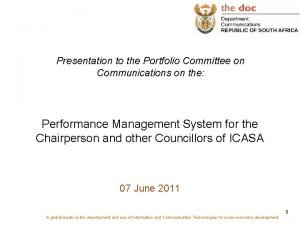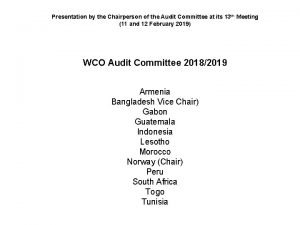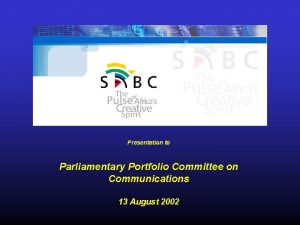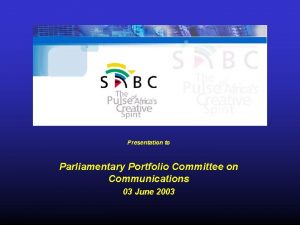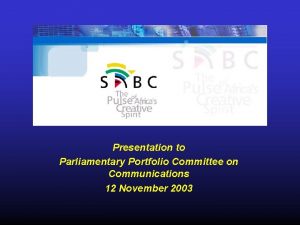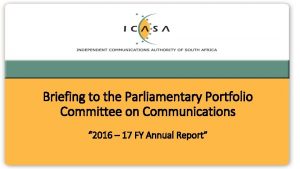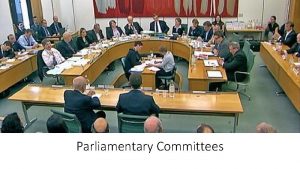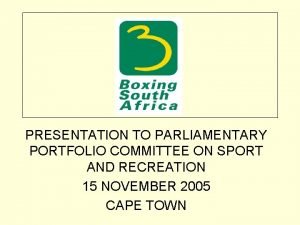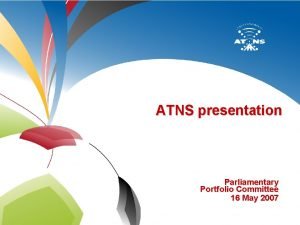Presentation to the Parliamentary Portfolio Committee on Communications


























- Slides: 26

Presentation to the Parliamentary Portfolio Committee on Communications 26 October 2010

SAPO Board • • The South African Post Office (SAPO) is a major state entity in terms of Schedule 2 of the PFMA and has as its accounting authority a Board appointed by the Minister of Communications. The SAPO Board is a Unitary Board comprising of a majority of non- executive directors and executive directors with the latter involved in the day to day running of the Company. The Minister of Communications in his capacity as the representative of the State and is the sole shareholder for the purposes of holding shares in the company. The Minister of Communications is the Executive Authority for purposes of the PFMA; The relationship between the shareholder and SAPO is governed by the Shareholders’ Compact which spells out the functions of the various SAPO stakeholders as required by Section 52 of the PFMA. The SAPO Board has established Committees that assist the Board in carrying out its mandate. There is within the Group subsidiary companies with their own Boards comprising of SAPO Board members. The Stamp Advisory Committee is an advisory Committee to the Minister on issues of philately and the SA Stamp Programme and is chaired by a non-executive SAPO Board member and has members with expertise in philately appointed by the shareholder as well as representatives of the shareholder.

SAPO GOVERNANCE STRUCTURE SHAREHOLDER MINISTER OF COMMUNICATIONS SAPO BOARD OF DIRECTORS EXCO SUBSIDIARY BOARD CFG DOCEX BOARD COMMITTEES POSTBANK COMMITTEE Click to edit Master subtitle style AUDIT COMMITTEE • • RISK MANAGEMENT COMMITTEE CHAIRPERSONS’ COMMITTEE Public Finance Management Act Companies Act Articles of Association Shareholders Compact Materiality and Significance Framework Board Charter Board Operations Manual HUMAN RESOURCES & TRANSFORMATION COMMITTEE REMUNERATION COMMITTEE STAMP ADVISORY COMMITTEE

SAPO BOARD MANDATE

SAPO MANDATE

Mandate of the Board • • • The Mandate of the SAPO Board is set out in the South African Post Office Act and has been encapsulated in the SAPO Board Charter as well as in the Shareholders' compact signed by the Board and the Minister as the shareholder representative. The shareholder compact also sets out the role, responsibilities, powers, reporting requirements of the parties. The Board Charter sets out the roles and responsibilities of the Board as a whole and of individual directors. The shareholder’s compact is revised annually by the parties and allows for inclusion of any additional requirements by the Minister to SAPO to meet explicitly stated Government socio-economic objectives. The approach by the SAPO Board in relation to its mandate is one that always ensures the increase of shareholder value as well as maximization of socio-political benefits in terms of the broader principles and policies of government.

SAPO BOARD COMPOSITION

SAPO Board & Committees • • Clause 8. 1 of the SAPO Articles provides for not less than seven (7) and not more than sixteen (16) Board members the majority of which must be non-executive directors; SAPO non-executive directors are appointed by the Minister or a three (3) year period at a time and not for more than two terms, unless determined otherwise by the Minister; Clause 8. 6 of the SAPO Articles stipulates the categories of persons excluded from being appointed as directors in accordance with the stipulations of the Companies Act; SAPO has the following executive directors appointed by the Minister on renewable fixed term contracts of five (5) years: – The Group Chief Executive Officer (CEO); – The Group Chief Operations Officer (COO); – The Group Financial Officer (CFO); and – The Managing Director (MD) Postbank; The SAPO Board currently comprises of fifteen (15) directors of which the majority are nonexecutive directors; He SAPO Articles of Association provides for the establishment of Board Committees to assist the Board in carrying out its mandate. The SAPO Articles allows the Board to also appoint independent persons or experts to any of its committees. Board members are allocated to the Committees of the Board and to the subsidiary Boards in line with their skills and expertise.

SAPO Subsidiary Boards • • There is within the Group subsidiary companies with their own Boards comprising of SAPO Board members. SAPO currently has two operating subsidiary companies: – The Courier and Freight Group – Document Exchange Group The Group holding Board appoints the directors of the subsidiary Boards in line with the founding documents and Articles of Association of the subsidiaries. At the SAPO subsidiary Board level some of the holding Group executives are appointed in a non-executive capacity to these Boards with the MD of the subsidiary being appointed as an executive director of the subsidiary Board. The subsidiary Boards currently each consists of six (6) seven (7) non-executive directors; and the Managing Director as a non-executive director. A Logistics Audit Committee has been established for the subsidiary Boards as a subcommittee of the Group holding Company in line with the requirements of the King III code on Good Corporate Governance. The SAPO Group is in the process of appointing an independent non-executive Chairperson for the Logistics Audit sub-committee to ensure compliance with the King III code.

SAPO Board Committees • • The SAPO Board has established Committees to assist the Board in carrying out its mandate. The following are the Committees of the SAPO Board: – Chairpersons’ Committee, made up of the Chairpersons of the committees below; • Audit Committee; • Risk Management Committee; • Human Resources and Transformation Committee; • Performance and Remuneration Committee; The following is an advisory Committee to the Minister: – Stamp Advisory Committee The Stamp Advisory Committee is an advisory Committee to the Minister on issues of philately and the SA Stamp Programme and is chaired by a non-executive SAPO Board member and has members with expertise in philately appointed by the shareholder as well as representatives of the shareholder.

Appointment of directors • • • I. t. o. the SAPO Articles, the following executive directors are appointed for fixed terms not exceeding five (5) years at a time and for not more than two terms, unless determined by the Minister otherwise: – CEO (CEO may not act as the Chairperson of the Board; – CFO; – COO; – Managing Director of Postbank – Any other executives directors whom the Minister so elects – Minister shall appoint two non-executive directors from candidates nominated by labour as per SAPO’s recognition agreement with labour; Directors may be appointed and replaced by the Minister at any time. Removal of directors by the Board must be done in accordance with the Section 220 of the Companies Act and the Labour Relations Act as well as clause 8. 10 of the SAPO Articles which sets out the conditions for termination of a directorship. Directors must retire by rotation at least once every three years except in the case of managing directors. The Articles of Association of the subsidiaries provide for the appointment of independent non-executive directors to the subsidiary Boards.

SAPO GOVERNANCE FRAMEWORK

Oversight and Monitoring • • • The relationship between the holding company and the subsidiary is subject to the shareholders’ agreement, the materiality and significance framework and the level of delegation of authority by the holding company to the subsidiary Board, the legal requirements applicable to the subsidiary as well as the fiduciary duties of the subsidiary directors to the subsidiary; The subsidiary Board reports to the Board on shareholder related matters and the subsidiary Audit Committee reports to the holding company Audit Committee; The holding company consults the subsidiary Chairman before nominating director/s to a subsidiary. The policies and procedures of the holding company are considered and approved by the subsidiary Board for implementation within the subsidiary company if appropriate; The SAPO Group has established sound and effective internal controls and governance processes which are applied within the Group, including the subsidiary companies, and which are aimed at: –Safeguarding the organisation’s assets; – Ensuring compliance with relevant Acts, Laws, Regulations, Policies and Procedures; –Ensuring efficiency of operations and processes; –Ensuring economical and efficient procurement of supplies & services; The SAPO Board remains the accounting authority for the Group in accordance with the provisions of the PFMA and the Preferential Procurement Framework.

Oversight and Monitoring • • The Board committees meet independently and then report back to the Board through their Chairpersons. Each committee has a formal charter that clearly defines its roles and responsibilities. Similarly, the subsidiary companies have their own independent and Unitary Boards that meet independently and makes policy pronouncements for the subsidiary company or recommendations to the Group Holding Board in line with the shareholders' agreements and delegation of authority/materiality framework; A comprehensive framework setting out the authorities and responsibilities of the various subcommittees and subsidiary companies within the Group is in place. All board-delegated authorities are reviewed and updated annually after due consultation and approval by the Minister

REPORTING

Reporting Requirements • • • In accordance with the shareholders’ compact and as required by the PFMA and Treasury Regulations, the Board of SAPO as the Accounting Authority is required to submit certain information to the shareholder and/or Treasury and this is set out in the shareholders agreement. Section 299 of the Companies Act requires directors to submit a report as part of the company’s Annual Financial Statements (AFS) which report should address the following: – The company’s state of affairs; – The company’s business; – The company’s profit and loss; and – Every issue that is either material or significant to shareholders A company is also required by law to keep the following statutory records and to have these audited on an annual basis, inter alia: a register of members; register of allotment of shares; a register of directors and officers interests which includes list of directorships in other companies and interests in contracts; minute books of directors and managers’ meetings; etc.

Reporting Requirements • • • The SAPO Group reports to the Minister as the executive authority, National Treasury, Parliament, Auditor General in line with the requirements of the PFMA and other relevant legislation and Treasury Guidelines. The Group further reports on its financial performance and strategic plan in line with the requirements of the Companies Act, the Protocol on Good Governance for State Owned entities, King III Codes on Good Corporate Governance. The Group submits quarterly reports of its performance against the corporate plan to the Minister and to National Treasury in line with the requirements of the PFMA and reports to the submits annual report including the audited annual financial statements for the Group and its subsidiaries to the Minister, National Treasury and to Parliament The SAPO subsidiaries hold annual general meetings annually to table its audited annual financial statements to the holding Board as the sole shareholder. The SAPO Group reports to the Minister on its performance at the annual general meeting.

BOARD EVALUATION

Board performance • • The Group holding Board on an annual basis reviews and evaluates its performance and that of its committees. The process includes a review and evaluation of the required mix of skills, expertise and other qualities required by the board in order to assess the effectiveness of the Board and its Committees. The Board also considers the participation and contribution of each individual director to ensure that areas of concern are addressed in the Board development or individual directors’ development plan. A similar Board evaluation mechanism is being considered for implementation and adoption by the subsidiary Boards in line with best practice standards.

LEGISLATIVE/ STATUTORY COMPLIANCE

SAPO Legislative Framework • • The South African Companies Act – Key legislation governing Companies in South Africa, in the process of being amended – It is anticipated that the new Companies’ Act will become operative towards the end of 2010 or early 2011, . – The Corporate Laws Amendment Act brings alignment with technological developments and recognizes meetings via teleconference, video conferencing etc. Public Finance Management Act (PFMA) No 1 of 1999, as amended, – Chapter 6 of the PFMA, deals with the accounting authorities for public entities Treasury Guidelines relating to SOEs – Treasury Practice notes to Accounting Authorities, as issued from time to time. Protocol on Good Corporate Governance in State Owned Entities (SOEs) – Provides guidelines to be followed by SOEs to ensure good corporate governance Shareholders’ Compact (as required by Section 52 of the PFMA) – Regulates the relationship between the shareholder and the Board and spells out the obligations of the following : • The shareholder; • The Board • The Executive Management SAPO Articles of Association – As required by the South African Companies Act to ensure adherence to principles of corporate governance applicable to good corporate governance; SAPO Board Charter – Contains the terms of reference for the Board and other issues relating to Board governance which may not be expressly spelt out in the Articles of Association SAPO Board Operational manual – Provides guidelines to the board on operational processes relating to the Board e. g. payment of travel and subsistence claims, fees for meeting attendance etc.

SAPO Legislative Framework • • SAPO enabling legislation – South African Post Office Act, currently being amended through the Post Office Bill Amendment; – The Postbank Bill which is intended to enable the corporatisation of Postbank; – The Postal Services Act currently being amended through the Postal Services Amendment Bill; Materiality and Significance Framework Treasury regulation 28. 3. 1 of the PFMA requires a public entity to develop and agree a significance framework with the relevant entity’s Executive Authority; Delegation of Authority – The Board has in place a system of delegating certain of its powers to management to allow for the effective running of the company. Other applicable legislation – Inter alia, labour, finance, taxation, health and safety, consumer protection legislation and industry specific legislation etc. King III Codes on Good Corporate Governance – Key corporate governance code for South Africa setting out governance principles and recommendations on how they are to be applied in practice. – The King III report came into effect from 01 March 2010 and its application has been extended to state owned enterprises and public entities. Other Codes – BBBEE, Preferential Procurement Guidelines, Employment Equity, etc.

Compliance checklist: KING III • The establishment of a Nominations Committee by the Board to consider the appointment of directors to the Board; (Targeted for full compliance in 2011) • The establishment of the Ethics committee as a committee of the Board; (Targeted for full compliance in 2011) • The Chairman of the Board can only Chair the Nominations Committee, and cannot be a Chairman of: - • • • – Remuneration Committee; – Risk Committee; and(Compliant) – Audit Committee. (Compliant) The Chief Executive Officer can only Chair the Risk Committee and cannot be a Chairman of: – Audit Committee; (Compliant) – Remuneration Committee; and (Compliant) – Nomination Committee. (Targeted for full compliance in 2011) At least an oral summary of committee/sub-committee deliberations to be presented at the Board meeting by: – Audit Committee Chair; (Compliant) – Remuneration Committee Chair; and (Compliant) – Risk Committee Chair. (Compliant) Membership: – – – Audit Committee to be all independent Non-Executive Directors; (Targeted for full compliance in 2011, requires amendment of Articles as directors are appointed by the Minister) Remuneration and Nominations Committee to be all Non-Executive Directors majority to be independent; and (Compliant) Risk Committee to be all Board members including Executive Directors. (Compliant)

Compliance checklist: KING III • • Shareholders expected to elect at least 3 audit committee members at each AGM, Nominations committee should present suitable members for election (only independent board members). (Targeted for full compliance in 2011, requires amendment of Articles as directors are appointed by the Minister) Shareholders to consider: – Independence of members (New definition: less than 5% interest in company considered independent); – Necessary level of financial literacy; and – The Audit Committee Chair should be an independent Non-Executive Director. Executives can act as subsidiary audit committee members, provided the committee is considered a sub committee of the holding company Audit Committee. (Compliant) Audit Committee members should collectively have a good understanding of financial risks, financial and sustainability reporting, internal controls and corporate law. (Compliant) The Audit Committee should understand the complexities of IFRS, Global Reporting Initiatives and SA GAAP. Independent contractors (to close identified skills gap) can be appointed on contractual terms and should not be entitled to vote. (Compliant) Premature termination of audit committee members to be concurred by the relevant Executive Authority for public sector companies. (Compliant) • Audit Committee recommendations and reports to be critically evaluated by the Board before approval. (Compliant) • Audit Committee responsibilities to extend beyond financial reporting to include sustainability reporting. (Compliant) • • Audit Committee Chair to promptly report to the relevant Executive Authority and to the Audit General any accounting officer implicated in fraud, corruption or gross negligence. (Compliant) To communicate any concerns deemed necessary to the Executive Authority, Relevant Treasury, the Auditor General and if appropriate to external auditors. (Compliant)

PC Requests • • The Portfolio Committee raised concerns around the number of Board members as proposed in the Postbank Bill and the governance of subsidiaries. The following scenarios are proposed by SAPO with regard to the number of Board members: – – – Scenario 1: 10 Non-executives + 2 shareholder representatives to the Postbank Board + 3 Executives = 15 Board Members Scenario 2: 8 Non-executives + 2 shareholder representatives to the Postbank Board + 3 Executives = 13 Board Members Scenario 3: 6 Non-executives + 2 shareholder representatives to the Postbank Board + 3 Executives = 11 Board Members

PC Requests • Inclusion of PFMA provisions in the Postbank Bill to ensure the following: – – Accountability of the subsidiary Boards and reporting to Parliament; Implementation of adequate and proper governance systems for subsidiaries Independence of the subsidiary Board members; Continuity of good corporate governance within SAPO despite changes in the Board;
 Portfolio committee on communications
Portfolio committee on communications Portfolio committee
Portfolio committee Portfolio committee on mineral resources and energy
Portfolio committee on mineral resources and energy Portfolio committee on basic education
Portfolio committee on basic education Portfolio committee on basic education
Portfolio committee on basic education Portfolio committee on higher education
Portfolio committee on higher education Voip presentation
Voip presentation Weebly teaching portfolio
Weebly teaching portfolio P&t committee presentation
P&t committee presentation Audit committee presentation
Audit committee presentation Loan committee presentation
Loan committee presentation Finance committee presentation
Finance committee presentation Product portfolio presentation
Product portfolio presentation Hát kết hợp bộ gõ cơ thể
Hát kết hợp bộ gõ cơ thể Ng-html
Ng-html Bổ thể
Bổ thể Tỉ lệ cơ thể trẻ em
Tỉ lệ cơ thể trẻ em Gấu đi như thế nào
Gấu đi như thế nào Tư thế worm breton
Tư thế worm breton Chúa sống lại
Chúa sống lại Môn thể thao bắt đầu bằng từ đua
Môn thể thao bắt đầu bằng từ đua Thế nào là hệ số cao nhất
Thế nào là hệ số cao nhất Các châu lục và đại dương trên thế giới
Các châu lục và đại dương trên thế giới Công của trọng lực
Công của trọng lực Trời xanh đây là của chúng ta thể thơ
Trời xanh đây là của chúng ta thể thơ Mật thư anh em như thể tay chân
Mật thư anh em như thể tay chân Phép trừ bù
Phép trừ bù
